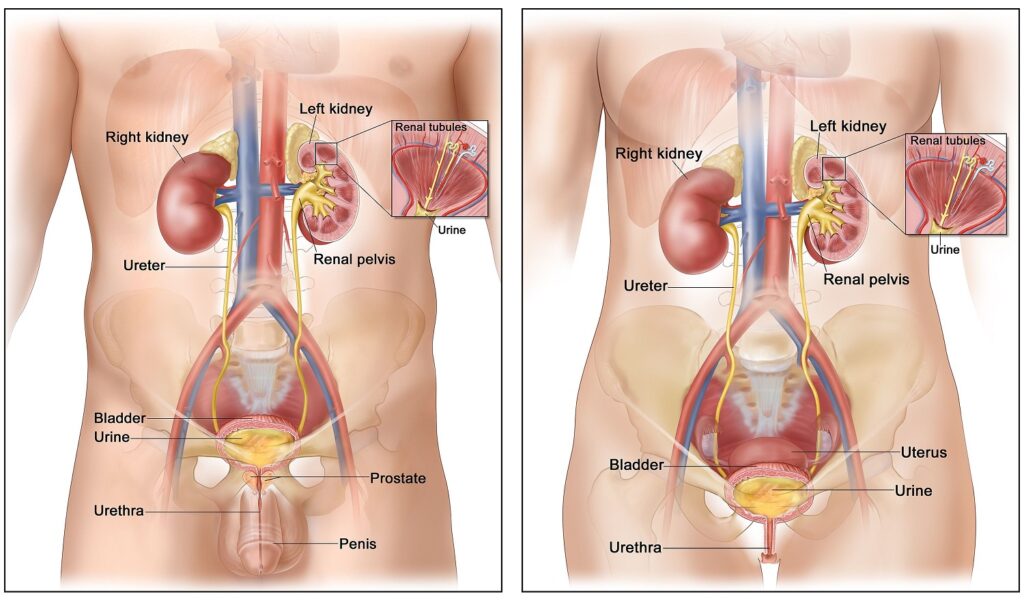
Kidney and bladder tumors are among the most common types of urogenital cancers and can range from benign growths to aggressive malignancies. Early detection plays a crucial role in improving treatment outcomes, yet these cancers often remain silent in the early stages.
Whether you’re experiencing urinary symptoms or just want to understand the risks, this guide offers a complete overview of kidney and bladder tumors, their causes, symptoms, and treatment options.
🧠 What Are Kidney & Bladder Tumors?
- Kidney Tumors originate in the tissues of the kidneys. These include:
- Renal cell carcinoma (RCC) – the most common form of kidney cancer
- Benign tumors like angiomyolipoma or oncocytoma
- Bladder Tumors develop in the inner lining of the bladder. Types include:
- Transitional cell carcinoma (TCC) – most common
- Squamous cell carcinoma
- Adenocarcinoma
- Benign polyps or papillomas
⚠️ Risk Factors & Causes
Several risk factors increase your chances of developing tumors in the kidneys or bladder:
- Smoking – Major contributor to bladder cancer
- Exposure to industrial chemicals, dyes, or radiation
- Chronic urinary tract infections (UTIs) or bladder inflammation
- Kidney diseases and long-term dialysis
- Family history of kidney or bladder cancer
- Obesity and hypertension
- Age – Risk increases after age 50
- Male gender – Bladder cancer is more common in men
🚨 Signs & Symptoms to Watch
Many early-stage tumors do not cause symptoms. When they do appear, they may include:
Kidney Tumor Symptoms:
- Blood in urine (hematuria)
- Persistent pain in the back or side
- Lump or mass in the abdomen
- Fatigue or anemia
- Unexplained weight loss
- Fever not caused by infection
Bladder Tumor Symptoms:
- Blood in urine (even without pain)
- Frequent or urgent urination
- Painful urination (dysuria)
- Lower abdominal pain or discomfort
- Recurrent UTIs
Note: Blood in urine is the most common early sign—don’t ignore it.
🧪 Diagnosis
Diagnosis usually includes:
- Urine tests – To detect blood or abnormal cells
- Ultrasound – To visualize masses in the kidney or bladder
- CT scan / MRI – For detailed imaging
- Cystoscopy – A small camera inserted into the bladder
- Biopsy – To confirm malignancy
- Blood tests – To assess kidney function
🩺 Treatment Options
Treatment depends on tumor type, size, and spread:
- Surgical removal:
- Partial or radical nephrectomy (for kidney tumors)
- TURBT (Transurethral Resection of Bladder Tumor) for bladder tumors
- Immunotherapy or targeted therapy – For advanced kidney cancer
- Chemotherapy or radiation – More commonly used in bladder cancer
- Intravesical therapy – Direct bladder treatment for superficial tumors
Early-stage tumors may be monitored through active surveillance.
📞 When to See a Urologist
You should consult a doctor if you experience:
- Blood in urine (even once)
- Unexplained abdominal or back pain
- Changes in urinary habits
- Frequent UTIs or painful urination
- Family history of kidney or bladder cancer
❓ FAQs
Is blood in urine always a sign of cancer?
No, but it’s a red flag that should always be evaluated.
Can kidney or bladder tumors be cured?
Yes, especially if detected early. Regular follow-up is key.
Are these tumors hereditary?
Some kidney cancers can be linked to genetic syndromes.
What lifestyle changes can help?
Quit smoking, stay hydrated, avoid exposure to harmful chemicals, and maintain a healthy weight.
✅ Final Thoughts
Kidney and bladder tumors often go unnoticed until they progress. By paying attention to early signs—especially blood in the urine—you can act quickly and improve your chances of successful treatment. Regular check-ups and healthy lifestyle choices are powerful tools for urogenital cancer prevention.
kidney tumor symptoms, bladder cancer signs, blood in urine causes, urologist in Guwahati, renal cell carcinoma, bladder tumor treatment, urinary cancer, painless hematuria, bladder mass, kidney lump
